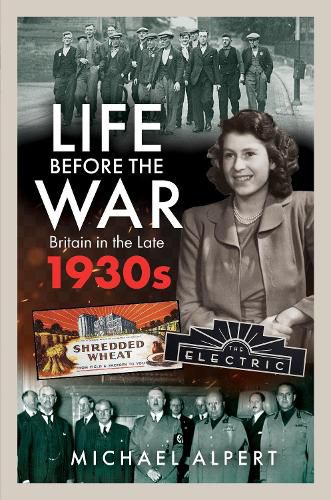Readings Newsletter
Become a Readings Member to make your shopping experience even easier.
Sign in or sign up for free!
You’re not far away from qualifying for FREE standard shipping within Australia
You’ve qualified for FREE standard shipping within Australia
The cart is loading…






In northern Britain and parts of Wales and Scotland, your life might well be dominated throughout the 1930s by unemployment, low wages, poor nutrition, ill health, and slum housing. But if you lived in the Midlands, London or the South-East, by the latter 1930s you would probably be enjoying a far better life, as you benefited from the spread of electric power, new factories and products, a greater variety of food, a huge private and public house-building programme and expansion of all sorts, much of it created by the sums spent on rearmament. For people living in prosperous areas, real wages rose substantially between 1936 and 1939, as was shown by their increased consumption of food and clothes. The latter 1930s were years of ever more widespread leisure pursuits, among them near-universal cinema-going, newspaper reading and, for many millions, holiday-making. A well-paid working man or office worker might even be able to buy a car. Even so, most working-class wages, especially for women, remained below those of the middle classes, and class differences were still clearly marked in housing, food, clothing, education, medical treatment, and purchasing power in general. Your views on religion, marriage, sex, and behaviour in general remained sharply defined and changed slowly, and only at the end of the decade could the beginnings of change be seen. At the same time the Second World War, which began on 3 September 1939, was the climax of a long period of increasing anxiety, during which the press, the wireless and the cinema newsreel brought foreign affairs more and more into your daily life. Using varied sources, including personal memories and daily life as pictured in newspapers and novels, Michael Alpert presents a broad picture of life for ordinary people in Britain nearly a century ago. AUTHOR: After graduating with a degree in Modern Languages from Cambridge, Michael Alpert joined the Bank of London and South America before leaving to teach French and Spanish in various secondary schools. He then became a lecturer and ultimately a Professor at the University of Westminster until his retirement, when he was granted the title of Emeritus. Thereafter, he taught at University College London, King's College London, Royal Holloway College, and Birkbeck College. In 1974, he was awarded his doctorate at Reading University for his thesis, The Republican Army in the Spanish Civil War of 1936-1939 (later published by Cambridge University Press). He has published several books on the Spanish Civil War, both in English and Spanish. His latest works are Franco and the Condor Legion: the Spanish Civil War in the Air (Bloomsbury Academic, 2019), The Spanish Civil War at Sea (Pen & Sword, 2021) and Living in Early Victorian London (Pen & Sword, 2023). 30 b/w illustrations
$9.00 standard shipping within Australia
FREE standard shipping within Australia for orders over $100.00
Express & International shipping calculated at checkout
In northern Britain and parts of Wales and Scotland, your life might well be dominated throughout the 1930s by unemployment, low wages, poor nutrition, ill health, and slum housing. But if you lived in the Midlands, London or the South-East, by the latter 1930s you would probably be enjoying a far better life, as you benefited from the spread of electric power, new factories and products, a greater variety of food, a huge private and public house-building programme and expansion of all sorts, much of it created by the sums spent on rearmament. For people living in prosperous areas, real wages rose substantially between 1936 and 1939, as was shown by their increased consumption of food and clothes. The latter 1930s were years of ever more widespread leisure pursuits, among them near-universal cinema-going, newspaper reading and, for many millions, holiday-making. A well-paid working man or office worker might even be able to buy a car. Even so, most working-class wages, especially for women, remained below those of the middle classes, and class differences were still clearly marked in housing, food, clothing, education, medical treatment, and purchasing power in general. Your views on religion, marriage, sex, and behaviour in general remained sharply defined and changed slowly, and only at the end of the decade could the beginnings of change be seen. At the same time the Second World War, which began on 3 September 1939, was the climax of a long period of increasing anxiety, during which the press, the wireless and the cinema newsreel brought foreign affairs more and more into your daily life. Using varied sources, including personal memories and daily life as pictured in newspapers and novels, Michael Alpert presents a broad picture of life for ordinary people in Britain nearly a century ago. AUTHOR: After graduating with a degree in Modern Languages from Cambridge, Michael Alpert joined the Bank of London and South America before leaving to teach French and Spanish in various secondary schools. He then became a lecturer and ultimately a Professor at the University of Westminster until his retirement, when he was granted the title of Emeritus. Thereafter, he taught at University College London, King's College London, Royal Holloway College, and Birkbeck College. In 1974, he was awarded his doctorate at Reading University for his thesis, The Republican Army in the Spanish Civil War of 1936-1939 (later published by Cambridge University Press). He has published several books on the Spanish Civil War, both in English and Spanish. His latest works are Franco and the Condor Legion: the Spanish Civil War in the Air (Bloomsbury Academic, 2019), The Spanish Civil War at Sea (Pen & Sword, 2021) and Living in Early Victorian London (Pen & Sword, 2023). 30 b/w illustrations